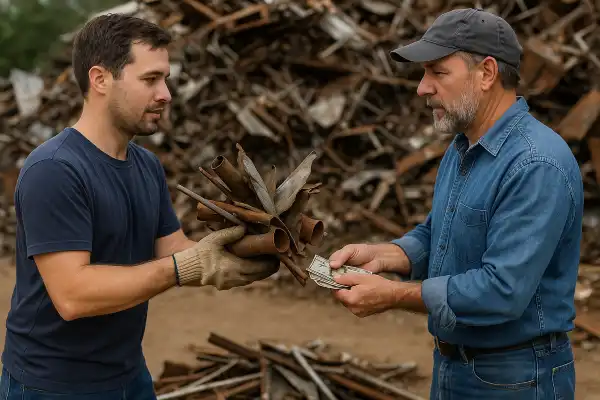Where can i find scrap metal near me? This question crosses the minds of countless individuals looking to turn unused materials into cash while contributing to environmental sustainability. Whether you’re a weekend warrior seeking extra income or a professional contractor managing project waste, the abundance of scrap metal opportunities in your local area might surprise you.
Having spent years transitioning from mechanical engineering into sustainability writing, I’ve witnessed firsthand how overlooked metal resources represent both environmental solutions and financial opportunities. During my early metalworking days, I learned that the most valuable finds often hide in the most ordinary places.
Where can i find scrap metal near me?
Scrap metal sources exist virtually everywhere human activity occurs, from construction sites and residential properties to commercial facilities and industrial operations. The key lies in understanding where to look, obtaining proper permissions, and recognizing valuable materials when you encounter them.

Construction and demolition sites
Construction and demolition sites represent some of the richest sources of scrap metal, generating everything from structural steel and copper piping to aluminum components and HVAC systems. These locations produce substantial quantities of recyclable materials that contractors often need removed efficiently.
Before demolition begins, valuable non-ferrous metals like copper, aluminum, and brass should be separated manually to maximize their value, as these materials can become contaminated or lost once mixed with demolition debris. Steel beams, rebar, and structural components constitute the bulk of ferrous materials at these sites.
Important: Never take anything from a construction site without explicit permission from the site manager or contractor, as unauthorized removal constitutes theft and can result in legal consequences. Instead, approach contractors to discuss mutually beneficial arrangements where you help with debris removal.
Residential sources around your home
Your immediate surroundings offer numerous scrap metal opportunities that many overlook. Start by examining your own property for unused metallic items including old appliances, cookware, patio furniture, and automotive parts.
Kitchen and bathroom renovations yield particularly valuable materials, including copper pipes, brass faucets, aluminum fixtures, and stainless steel appliances. HVAC systems contain abundant scrap materials such as aluminum condensers, copper tubing, and steel ductwork.
Approach neighbors about collecting their unwanted metal items – many homeowners gladly dispose of old appliances, broken lawn equipment, and metal furniture when someone offers to remove them at no cost.
Appliances and electronic equipment
Large household appliances like washing machines, dryers, dishwashers, and refrigerators contain significant amounts of recyclable metals including steel, aluminum, copper wiring, and occasionally brass components. Older appliances typically contain more copper, making them particularly valuable for scrap recycling.
Focus on larger appliances rather than smaller ones like microwaves or toasters, as the time investment for dismantling smaller items often doesn’t justify the metal yield. Before processing appliances, always disconnect power sources and drain any remaining fluids for safety.
Community events and yard sales
Yard sales, garage sales, estate sales, and flea markets provide excellent opportunities to acquire scrap metal at low costs. These venues often feature old tools, decorative items, furniture, and household goods containing valuable metals.
Event venues after festivals, concerts, or large gatherings accumulate significant quantities of aluminum cans and containers that organizers typically allow collectors to remove. Building relationships with event organizers can create ongoing collection opportunities.
Industrial and commercial sources
Auto repair shops, boat repair facilities, electrical appliance service centers, and machinery repair operations generate regular scrap metal waste that business owners often appreciate having removed. These businesses benefit from partnerships with responsible recyclers who help maintain clean work areas while providing additional revenue streams.
Office buildings and retail operations regularly update fixtures, displays, and furniture, creating opportunities for scrap metal collection during renovations or relocations. Storage facilities with abandoned units sometimes auction contents that include valuable metal items.
Farm and rural properties
Rural areas contain abundant scrap metal sources including old farm equipment, tractors, implements, and machinery that property owners need removed. Pre-1960s farm equipment typically contains heavier, more valuable cast iron and steel components, making older equipment particularly profitable despite surface rust.
Legal considerations and permissions
Understanding legal requirements ensures compliance and prevents theft accusations – always obtain proper permission before collecting materials from any property not your own. When selling scrap metal, be prepared to provide valid government-issued photo identification, as recyclers must record seller information to prevent metal theft.
Cash payments for scrap metal are prohibited in many jurisdictions – legitimate dealers typically pay by check or electronic transfer to create proper documentation. Some materials like catalytic converters, certain copper items, and infrastructure-related metals have additional documentation requirements or restrictions.
Safety and preparation tips
Safety should always be the primary concern when collecting and handling scrap metal. Wear appropriate protective equipment including gloves, safety glasses, and sturdy footwear. Construction and demolition sites contain hazardous substances like lead, asbestos, and other pollutants that require professional handling.
Separate ferrous and non-ferrous metals before transport using a magnet test – ferrous metals stick to magnets while more valuable non-ferrous metals like copper, aluminum, and brass do not. Proper sorting maximizes value and streamlines the selling process.
Conclusion
Finding scrap metal near you requires combining systematic searching with relationship building and legal compliance. Last month, while helping a neighbor clear out their basement workshop, I discovered an old copper water heater and aluminum storm doors they’d forgotten about – materials worth over $200 that would have otherwise gone to the landfill. This experience reinforced my belief that the most rewarding scrap opportunities often emerge through community connections and patient observation of everyday metal waste streams.

